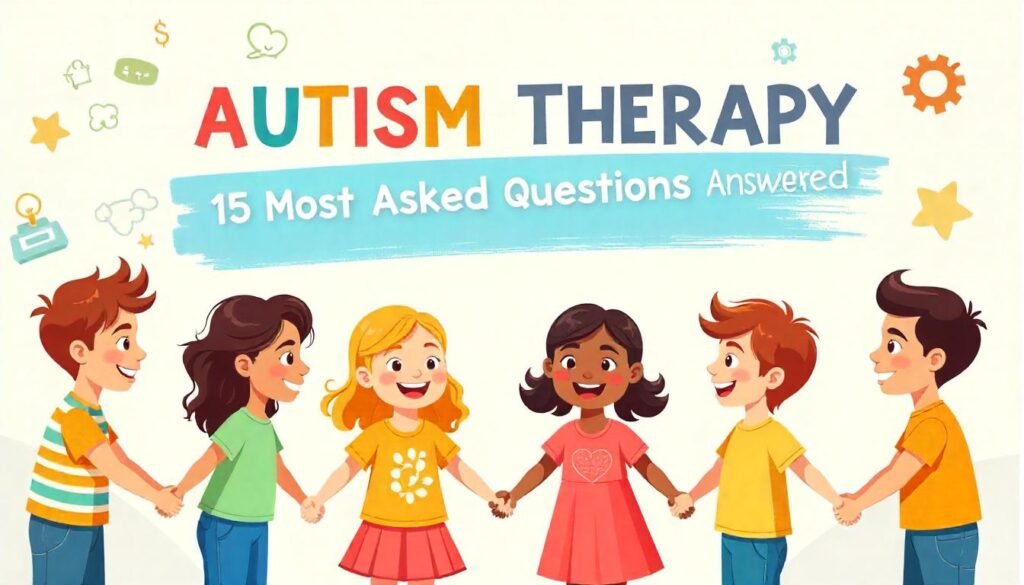Autism Therapy: 15 Most Asked Questions Answered
1. What Is the Most Effective Therapy for Children With Autism?
The most effective therapy depends on a child’s individual needs. However, ABA therapy for Autism (Applied Behavior Analysis) is widely recognized for building essential skills through positive reinforcement. When combined with other therapeutic approaches for Autism, it forms a well-rounded strategy that supports a child’s overall development.
2. How Does ABA Therapy Help Children on the Autism Spectrum?
ABA therapy helps improve communication, social, academic, and self-care skills by breaking tasks into smaller steps and reinforcing positive behaviors. It is one of the most commonly used methods in Autism Spectrum Therapy, especially for children with developmental delays.
3. What Are the Different Types of Therapy Available for Autism?
There are several Autism treatment options, including:
✅ ABA Therapy for Autism
✅ Speech Therapy for Autism
✅ Occupational Therapy for Autism
✅ Sensory Integration Therapy
✅ Behavioral and social skills training
A multidisciplinary approach works best for children on the spectrum.
4. Can Autism Therapy Improve Social and Communication Skills?
Yes. Autism therapy often targets social and communication development. ABA, speech, and play-based therapies can significantly improve a child’s ability to interact, express emotions, and build relationships over time.
5. At What Age Should Autism Therapy Begin for Best Results?
Early autism intervention is key. Starting therapy between 18 months and 3 years old, right after an autism diagnosis and treatment plan is developed, leads to the most meaningful improvements in behavior and learning.

6. Is Occupational Therapy Necessary for Autistic Children?
Occupational Therapy for Autism helps children with motor coordination, daily routines, and sensory processing challenges. It’s especially beneficial for children who struggle with physical tasks or emotional regulation.
7. How Long Does Autism Therapy Typically Last?
Duration varies depending on individual needs. Some children benefit from 10–15 hours per week, while others may need 30–40. Progress is often reviewed every few months to adjust the plan based on developmental goals.
8. What Questions Should I Ask Before Starting Autism Therapy?
Before starting therapy, ask about:
☑️ Therapist qualifications
☑️ Parent involvement
☑️ Program structure and goals
☑️ Types of therapies offered
☑️ Success metrics
Providers like AB Spectrum guide families through these questions during consultation.
9. Are There Any Side Effects or Risks With Autism Therapies?
Most autism support services are safe when delivered by trained professionals. Risks are minimal, but children may feel overwhelmed if sessions are not paced appropriately. Customization and observation help avoid such issues.
10. What Should Parents Expect During Autism Therapy Sessions?
Sessions may include structured learning, play-based interaction, reinforcement strategies, and communication training. Whether the therapy is ABA, speech, or behavioral therapy for Autism, parents often receive regular updates to stay involved in their child’s progress.

11. Is Speech Therapy Effective for Nonverbal Children With Autism?
Yes. Speech therapy for Autism is highly effective for developing both verbal and non-verbal communication. Tools like PECS, sign language, and AAC devices are often used to help nonverbal children communicate their needs and thoughts.
12. Can Autism Therapy Be Done at Home With Parental Support?
Yes, many treatment for Autism plans include at-home activities. With proper training, parents can support behavior plans, communication practice, and structured routines. Some providers also offer home-based programs and coaching for families.
13. How to Find a Qualified Autism Therapist Near Me?
Search for certified therapists who specialize in Autism Spectrum Therapy and have experience working with children of similar age and needs. AB Spectrum offers both in-person and virtual services to ensure flexibility and access to quality care.
14. Does Health Insurance Cover Autism Therapy Services?
Most health insurance plans now cover ABA therapy, and many also include speech and occupational therapy for autism. It’s best to check with your provider for details. Reputable clinics often assist with the insurance process to ease the burden on families.
15. What Are the Signs That Autism Therapy Is Working?
Signs include improved communication, fewer meltdowns, better focus, increased eye contact, and successful transitions. A steady pattern of skill development and independence over time suggests the ASD therapy is effective and tailored well.
Start Your Child's Therapy Journey With Confidence
At AB Spectrum, we believe every child deserves a personalized and compassionate approach to Autism Therapy. Our programs are designed to support meaningful growth across behavior, communication, and sensory needs.
Our Latest Blogs

What is Natural Environment Teaching and Why It Works for Autism

How Verbal Behavior Therapy Helps Children with Autism Communicate Better

The Power of Play: How Play Therapy Helps Children with Autism

Why Social Skills Training Matters for Children on the Autism Spectrum

What Is Sensory Integration Therapy And How Does It Help Children with Autism?


